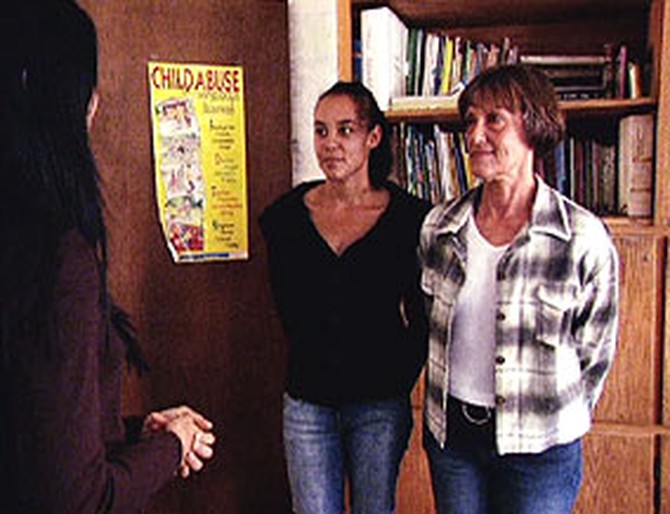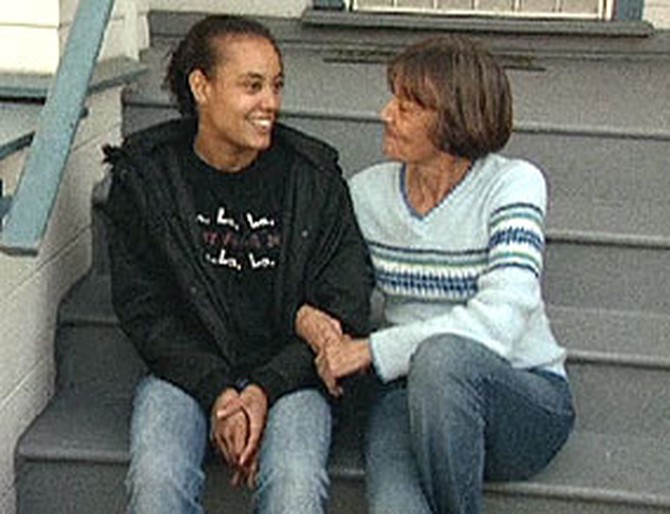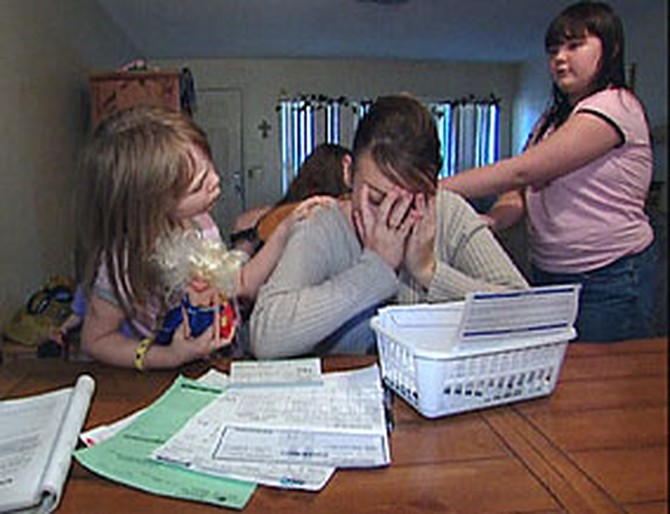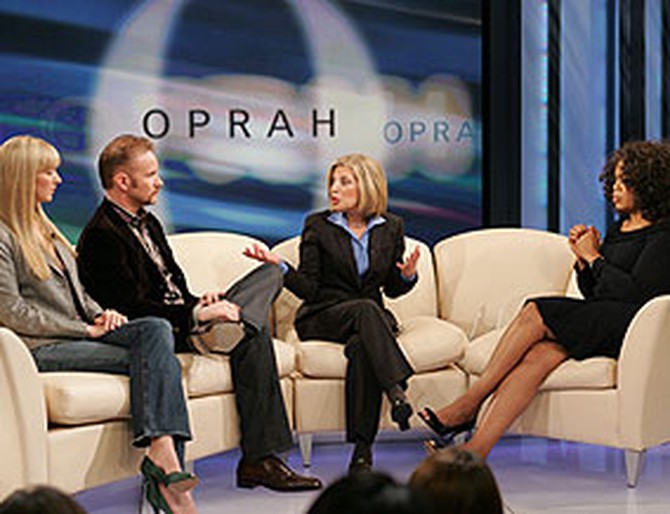Paying the Price
By Lisa Ling

Even with full-time work, many American families can't make ends meet. Millions end up losing their homes and living on the street after suffering small financial setbacks. Lisa Ling went on special assignment for The Oprah Winfrey Show. She met Betty and her daughter Kelly, who had been living in a homeless shelter for the past three months.
Before moving into this California homeless shelter, they were living in their car. Betty says their lives took a turn for the worse when she fell off a bicycle and fractured her wrist. Unable to work, Betty didn't qualify for unemployment or workman's compensation benefits. Within two months of her injury, Betty and her daughter were homeless.
Living in the shelter wasn't easy. "It makes you feel like a failure," Betty says. "There's just a sense of hopelessness and helplessness."
At one point, she even considered turning Kelly over to Child Protective Services so her daughter would have a chance at a better life. But, Kelly refused to leave her mother.
Before moving into this California homeless shelter, they were living in their car. Betty says their lives took a turn for the worse when she fell off a bicycle and fractured her wrist. Unable to work, Betty didn't qualify for unemployment or workman's compensation benefits. Within two months of her injury, Betty and her daughter were homeless.
Living in the shelter wasn't easy. "It makes you feel like a failure," Betty says. "There's just a sense of hopelessness and helplessness."
At one point, she even considered turning Kelly over to Child Protective Services so her daughter would have a chance at a better life. But, Kelly refused to leave her mother.

Kelly's safety is always Betty's biggest concern. Children aren't allowed in the shelter without parental supervision, so every day after school, Kelly would wander the streets until her mom was done with work.
Betty says she struggled to stay optimistic. "The thing that hurts the most is [people] thinking that you're lazy…that you don't care," she says. "That's so far from the truth. I'm working. I'm dedicated. I'm a good person. I'm a good mom. Just because I'm in a shelter and I'm homeless doesn't mean that I'm a deadbeat."
Betty says she struggled to stay optimistic. "The thing that hurts the most is [people] thinking that you're lazy…that you don't care," she says. "That's so far from the truth. I'm working. I'm dedicated. I'm a good person. I'm a good mom. Just because I'm in a shelter and I'm homeless doesn't mean that I'm a deadbeat."

Recently, Betty accepted a job as a receptionist in a dental office that pays $10 an hour. With her new salary, Betty is able to afford a one-bedroom apartment.
Even though they no longer have to share a shower with 20 other people, their new financial standing also poses other problems. Betty says because she makes more than minimum wage, she no longer qualifies for state-administered food stamps or medical aid.
Betty is still living paycheck to paycheck. "Even though Kelly and I are comfortable in our new home, it never leaves the front of my mind that I could still lose it all," Betty says. "It causes me to have a lot of sleepless nights, and it keeps me from rejoicing in the triumphs that I have made."
Even though Betty still worries about the future, Kelly takes pride in her mother's accomplishments. "She's worked really hard to get us to this point, and she hasn't let me down," Kelly says. "She stayed by my side."
Even though they no longer have to share a shower with 20 other people, their new financial standing also poses other problems. Betty says because she makes more than minimum wage, she no longer qualifies for state-administered food stamps or medical aid.
Betty is still living paycheck to paycheck. "Even though Kelly and I are comfortable in our new home, it never leaves the front of my mind that I could still lose it all," Betty says. "It causes me to have a lot of sleepless nights, and it keeps me from rejoicing in the triumphs that I have made."
Even though Betty still worries about the future, Kelly takes pride in her mother's accomplishments. "She's worked really hard to get us to this point, and she hasn't let me down," Kelly says. "She stayed by my side."

Supporting one child on minimum wage is hard enough, but imagine feeding a family of six with only $16,800 a year. Brian and Mary are faced with this reality every day.
Brian, who draws blood and does lab work at a local hospital, makes $9.22 an hour. Annually, he makes $9,000 less than the federal poverty level and still manages to provide for his wife and four daughters. His wife Mary had to quit her job after one of their daughters was diagnosed with autism, and that's when their financial situation turned desperate.
The Templeton family does not qualify for Medicaid and they have no health insurance. Medical bills keep piling up. The last bill they received was for $5,000.
Brian, who draws blood and does lab work at a local hospital, makes $9.22 an hour. Annually, he makes $9,000 less than the federal poverty level and still manages to provide for his wife and four daughters. His wife Mary had to quit her job after one of their daughters was diagnosed with autism, and that's when their financial situation turned desperate.
The Templeton family does not qualify for Medicaid and they have no health insurance. Medical bills keep piling up. The last bill they received was for $5,000.

Each week, the Templetons spend about $250 on groceries. Food costs put the biggest strain on their budget, and some weeks, they have to rely on state assistance.
"I've been forced to go to the food pantry, and it makes me want to climb into a hole and cry," Mary says. "I have to keep my tears to myself because I can't let the children see that I'm worried."
Financial struggles also weigh on Brian, the family's sole breadwinner. "Sometimes I do feel like a failure," he says. "It makes me want to get in the car and start driving and never go back."
With no savings, Brian and Mary know that if they suffer a setback, they could end up on the streets like Betty and Kelly. "Each and every day on minimum wage, you have this sick feeling in the pit of your stomach that you are this close from being on the streets," Mary says. "It's constant stress and constant worry. It never lets up."
"I've been forced to go to the food pantry, and it makes me want to climb into a hole and cry," Mary says. "I have to keep my tears to myself because I can't let the children see that I'm worried."
Financial struggles also weigh on Brian, the family's sole breadwinner. "Sometimes I do feel like a failure," he says. "It makes me want to get in the car and start driving and never go back."
With no savings, Brian and Mary know that if they suffer a setback, they could end up on the streets like Betty and Kelly. "Each and every day on minimum wage, you have this sick feeling in the pit of your stomach that you are this close from being on the streets," Mary says. "It's constant stress and constant worry. It never lets up."

Beth Shulman is the former vice president of the United Food and Commercial Workers Union and author of the book The Betrayal of Work: How Low-Wage Jobs Fail 30 Million Americans. She says that as a nation, we can start making different choices that ensure the American dream is a reality for everyone.
First, citizens should urge Congress and the Senate to approve an increase in the federal minimum wage, Beth says. Some states—such as Illinois, Florida, Hawaii and California—have already passed laws to raise their minimum wage above the federal rate of $5.15.
Second, employers should ensure that every American has health insurance, Beth says. She also points out that 75 percent of all low-wage workers do not get any paid vacation or sick days per year. "They have to choose between taking care of a sick child … and losing their job," she says.
First, citizens should urge Congress and the Senate to approve an increase in the federal minimum wage, Beth says. Some states—such as Illinois, Florida, Hawaii and California—have already passed laws to raise their minimum wage above the federal rate of $5.15.
Second, employers should ensure that every American has health insurance, Beth says. She also points out that 75 percent of all low-wage workers do not get any paid vacation or sick days per year. "They have to choose between taking care of a sick child … and losing their job," she says.

Most people think low-wage workers are teenagers or high-school dropouts…but that's not the case, Beth says. "They're adults like the rest of us trying to take care of their families," Beth says. "Most have a high school degree—many have college degrees. It's every mom and dad in America."
Another misconception is that low-wage workers are "lazy." While Morgan and Alex were living on minimum wage for 30 Days, they experienced just the opposite. "I worked harder bussing tables than at any desk job I ever had," Alex says.
James, an administrative assistant who makes $9 an hour, says that because he makes more than minimum wage, people think it is a lot of money…but it's not. He's even considered getting a second job, but he doesn't have any paid days off to go look for additional employment.
The future doesn't have to be bleak for James and the 30 million Americans who live paycheck to paycheck, Beth tells Oprah.
"We can make choices about what kind of America we want," she says. "We need to ensure people have a living wage and health benefits and time off to be with their families."
Another misconception is that low-wage workers are "lazy." While Morgan and Alex were living on minimum wage for 30 Days, they experienced just the opposite. "I worked harder bussing tables than at any desk job I ever had," Alex says.
James, an administrative assistant who makes $9 an hour, says that because he makes more than minimum wage, people think it is a lot of money…but it's not. He's even considered getting a second job, but he doesn't have any paid days off to go look for additional employment.
The future doesn't have to be bleak for James and the 30 million Americans who live paycheck to paycheck, Beth tells Oprah.
"We can make choices about what kind of America we want," she says. "We need to ensure people have a living wage and health benefits and time off to be with their families."
Published 04/14/2006

